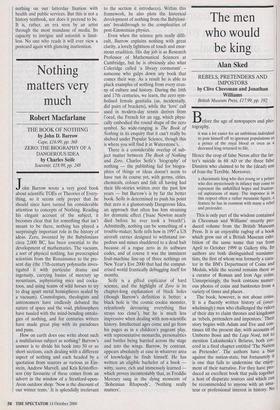The men who would be king
Alan Sked
REBELS, PRETENDERS AND IMPOSTORS by Clive Cheesman and Jonathan Williams British Museum Press, £17.99, pp. 192 efore the age of newspapers and pho- tography, it was a lot easier for an ambitious individual to pass himself off to ignorant populations as a prince of the royal blood or even as a deceased king returned to life.
Hence the crop of false Neros after the lat- ter's suicide in 68 AD or the three false Dimitris who claimed to be the (dead) son of Ivan the Terrible. Moreover,
a charismatic king who dies young or a prince who dies mysteriously in infancy may come to represent the unfulfilled hopes and frustrat- ed aspirations of many. The impostor is in this respect often a rather messianic figure, a feature he has in common with many a rebel and pretender.
This is only part of the wisdom contained in Cheesman and Williams' smartly pro- duced volume from the British Museum Press. It is an enjoyable ragbag of a book which grew out of a British Museum exhi- bition of the same name that ran from April to October 1999 in Gallery 69a. Its authors are both distinguished numisma- tists, the first of whom was formerly a cura- tor in the BM's Department of Coins and Medals, while the second remains there as a curator of Roman and Iron Age coins. Unsurprisingly, the book contains numer- ous photos of coins and banknotes from a variety of times and places.
The book, however, is not about coins. It is a fluently written history of (over- whelmingly) men who challenged the rulers of their day to claim thrones and kingdoms as 'rebels, pretenders and impostors.' Their story begins with Adam and Eve and con- tinues till the present day, with accounts of Umberto Bossi and the Lega Nord, not to mention Lukashenka's Belarus, both cov- ered in a final chapter entitled 'The Nation as Pretender'. The authors have a bias against the nation-state, but fortunately it is one that fails to undermine the enjoy- ment of their narrative. For they have pro- duced an excellent book that pulls together a host of disparate sources and which can be recommended to anyone with an ama- teur or professional interest in history. No one could fail to find this volume both informative and amusing.
Those interested primarily in British his- tory will find themselves particularly well served. There are not only lucid accounts of the Wars of the Roses and the Jacobites, of Perkin Warbeck and Lambert Simnel, but even Carausius, Roman Emperor of Britain and (in a chapter headed 'Dream- ers and Hoaxers') 'Prince Michael of Albany' (a Belgian who today claims to be our rightful Stuart monarch). There are accounts of other Stuart pretenders also the 19th-century Sobieski-Stuarts, for example — as well as the tale of `King Anthony', a Shropshire policeman who in the course of the 1930s conceived and developed the notion that he was the legitimate male-line descendant of Henry VIII and thus the rightful king of England.
The book, however, is not in the least Anglo-centric. It covers the histories of France, Germany, Haiti, Russia, modern and ancient Greece, ancient Rome and the Byzantine empire, not to mention the Kingdom of Araucania and Patagonia. The latter may take the reader into the ter- ritory of Trivial Pursuit, but for the most part the book covers events of historical importance and significance. It has inter- esting things to say about the difference between kings and emperors and never fails to illuminate whatever crevice of the historical record it chooses to investigate. Even the subsection on the successful revo- lution in Haiti — by no means an easy sub- ject to pin down — contains a useful account of Toussaint, one of the few peo- ple recorded in the book who was actually rather impressive:
Toussaint's settlement of Haiti was carefully thought out, the farm slaves being compelled to return to their labours as free men; Catholicism was encouraged and the clergy treated with respect, strict measures being taken against voodoo; agreement was reached with the French government where- by elected Haitian representatives were sent to the Corps Legislatif in Paris. Finally, in May 1801 a new constitution was declared under which Toussaint was governor-general on the republic's behalf...
The story of Tousaint's arrest by the French and of Dessalines' declaration of independence in 1804, followed by his ele- vation to imperial status, followed by the triumph of Cristophe and the proclamation of Haiti as a kingdom in 1811, is told with skill and economy. Indeed, all the tales that comprise the contents of this book are related with the same virtues.
All in all, it would make an excellent pre- sent for anyone interested in almost any period of history. It wears its learning light- ly and makes a fascinating read.



















































































 Previous page
Previous page